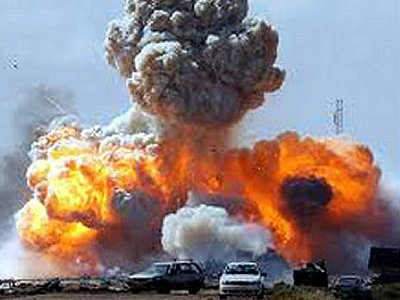
MOTHER TERESA WITH ROCKET LAUNCHERS
Is humanitarian warfare a contradiction in terms or a necessary component of a civilised world?
It is now more or less two decades since the appalling Bosnian war and the genocide in Rwanda, which scarred the complacent post-Cold War world with the enduring barbarity of the human race. The failure of the Western world to intervene properly to put an end to a series of atrocities in the Balkans and a ruthlessly executed massacre in Rwanda had a profound impact on the next generation of political leaders. Tony Blair became a leading proponent of humanitarian intervention, enunciated in his 1999 Chicago doctrine where he claimed the international community has an obligation to intervene in the internal affairs of a nation when communities within it are being repressed.
This is now enshrined in the UN declaration called the Responsibility to Protect (known as R2P) which says:
‘We are prepared to take collective action…on a case by case basis…should peaceful means be inadequate and national authorities manifestly fail to protect their populations from genocide, war crimes, ethnic cleansing and crimes against humanity’.
Blair noted: ‘for the first time at this summit we agreed that states do not have the right to do what they will within their own borders’.
Successful interventions occurred in Kosovo and Sierra Leone but these were followed by the invasion of Iraq which was sold to the British public much more than to an American one as a humanitarian war to rid the Iraqis of the cruel and despotic Saddam. The post-invasion civil war over which the allied troops helplessly presided for so long and the enduring violence and tension which persist caused an almost fatal blow to the concept of humanitarian warfare.
R2P seemed to find new life in the intervention over Libya, where airpower enabled guerrilla forces to repel and finally overcome Gaddafi. The issues raised by this are characteristic of the humanitarian dilemma. Many vehemently opposed this campaign, yet had events been allowed to take their course there would have been an appalling reckoning for the trapped citizens of Benghazi, the large eastern city historically opposed to Gaddafi. An atrocity on a greater scale than Srebrenica may have transpired. The foreign policy realists who filled our newspapers with their repudiation of military help conveniently never had to explain why it was right to have permitted a massacre to unfold. Had this happened, our consciences would have been seared with the horror of Bosnia all over again, amid claims that we had learned nothing.
Yet the realists have a point, for once intervention is made, we can never be sure of the outcome. Libya is far from safe today, with a weak government, a heavily armed population and rival tribes with scores to settle making the country a perilous place for precisely the weak and vulnerable the armed assistance was meant to protect. One side effect has been to split neighbouring Mali politically as Gaddafi’s mercenaries return to the own land, armed and itching for confrontation.
The vicious and emerging civil war in Syria is recognition of the perils of intervention in complex and volatile settings. If R2P is to mean anything, it should take responsibility for the prevention of civil war in the aftermath of conflict and physical reconstruction. The signs, however, are not promising. The reluctance to put troops in harm’s way in far-off places has been reinforced by the experiences in Iraq and Afghanistan. The western financial crisis leaves little appetite for the kind of large scale aid which is needed. Meanwhile China, which has the cash, is implacably opposed to intervening in the affairs of other nations. Developing nations are responding warmly to Beijing’s stance on such matters as the new century unfurls.
The Just War tradition was developed in part by Christian thinkers and humanitarian war is one attempt to renew its principles for today, yet there are awkward questions surrounding it. Humanitarian war is not war with a human face because this is not possible. As Wilfred Owen said, war is the ‘abode of madness’. No missile is so smart that it does not kill and maim innocent people and artillery fire remains appallingly indiscriminate. This is inevitable, but is it an acceptable price to pay, especially if civil war may result? What are the Christian parameters of the new warfare, if they exist at all? Toby Zeigler’s cynical observation in TV’s The West Wing cannot be ignored. For him, humanitarian intervention was like ‘Mother Teresa with rocket launchers’. Making logic of an oxymoron is uncomfortable work.
POPULAR ARTICLES

Obama's Covert Wars
The use of drones is going to change warfare out of all recognition in the next decades.

Through A Glass Starkly
Images of traumatic incidents caught on mobile phone can be put to remarkable effect.

What Are British Values?
Is there a British identity and if so, what has shaped the values and institutions that form it?


